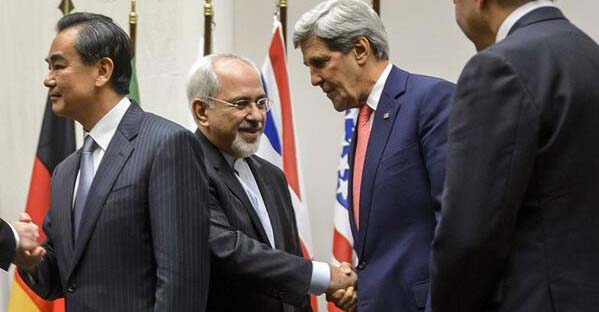GENEVA - U.S. Secretary of State John Kerry and his Iranian counterpart Mohammad Javad Zarif will try to narrow gaps in another round of nuclear talks in Geneva on Sunday as they press to meet a March 31 deadline for a political framework agreement.
Before Kerry's arrival in Geneva, Zarif told Iranian state media that mid-level bilateral talks had produced "good discussions but no agreements", and some differences remained.
"The fundamental gap, in my view, is psychological. Some Western countries, the United States in particular, see sanctions as an asset, a lever to exert pressure on Iran. As long as this thinking persists it will be very hard, difficult to reach a settlement."
Joining the talks for the first time are U.S. Secretary of Energy Ernest Moniz and Iran's nuclear chief Ali Akbar Salehi, as well as a close aide and the brother of Iranian President Hassan Rouhani, Hossein Fereydoon.
Zarif said this reflected a need "for higher level people with all-embracing command over all issues", while Fereydoon was involved for better "coordination with the president".
Kerry said on Saturday the presence of Moniz reflected the highly technical nature of the current talks and in no way meant "that something is about to be decided".
"There is still a distance to travel," Kerry said in London where he met British Foreign Secretary Philip Hammond.
The negotiations between Iran and "P5+1" powers - the United States, Britain, France, Germany, Russia and China - have reached a sensitive stage with gaps remaining, mainly over Iranian uranium enrichment and the pace of removing sanctions.
Kerry said U.S. President Barack Obama was not inclined to extend the talks again. The parties already missed a November 2014 target date.
Obama believed it was "imperative to be able to come to a fundamental political outline and agreement within the time space that we have left," Kerry said.
"If that can't be done, it would be an indication that fundamental choices are not being made that are essential to doing that," Kerry added, also emphasizing that Obama was prepared to halt the talks if he thought they were not being productive.
Zarif said Rouhani would not accept a small, short-term agreement, nor a broad accord that left room for interpretation.
Israeli Prime Minister Benjamin Netanyahu, who has been increasingly critical of U.S. policy, said it was "astonishing" that the talks, which could end by allowing Iran "to develop the nuclear capabilities that threaten our existence", were proceeding.
Any agreement would be "dangerous for Israel, the region and the entire world," Netanyahu said in public remarks to his cabinet on Sunday.
A recent U.N. report said that Iran had refrained from expanding tests of more efficient models of a machine used to refine uranium under a nuclear agreement with the six world powers. Development of advanced centrifuges is feared to lead to material potentially suitable for manufacture of nuclear bombs.Iran says it does not intend to develop atomic bombs. (Reuters)

